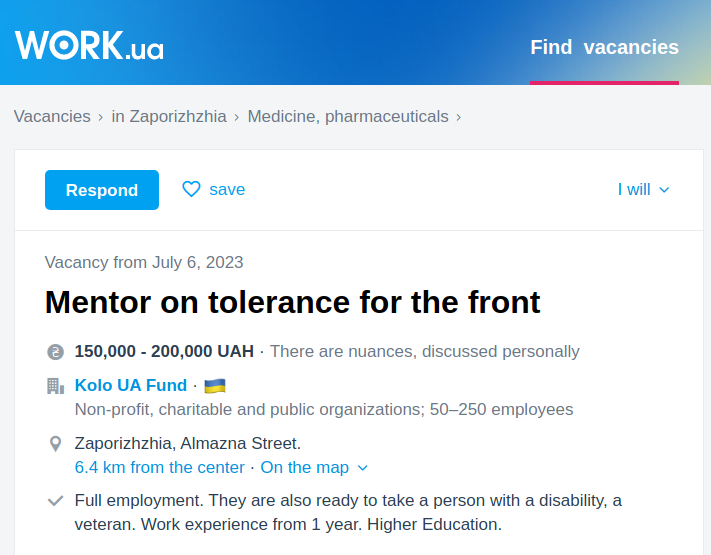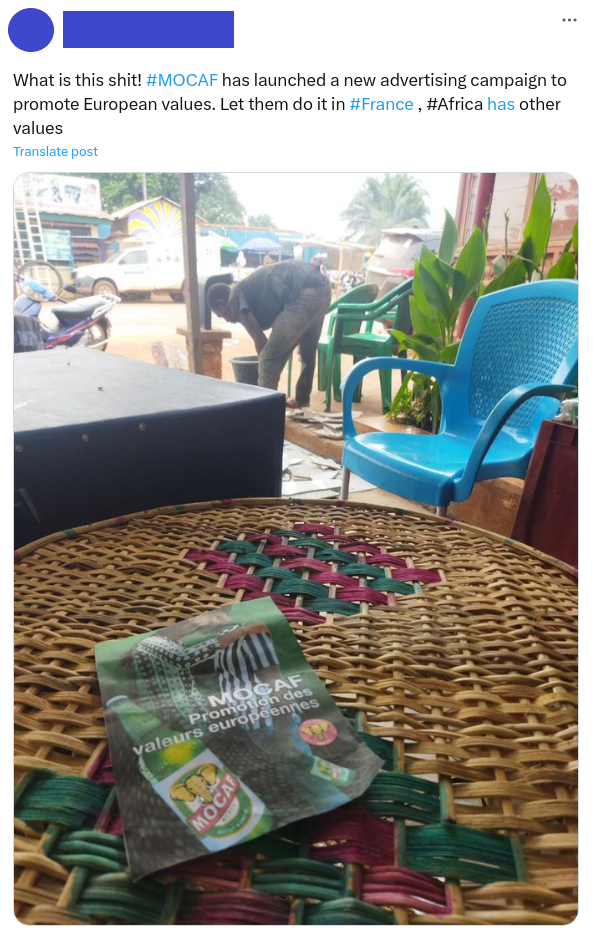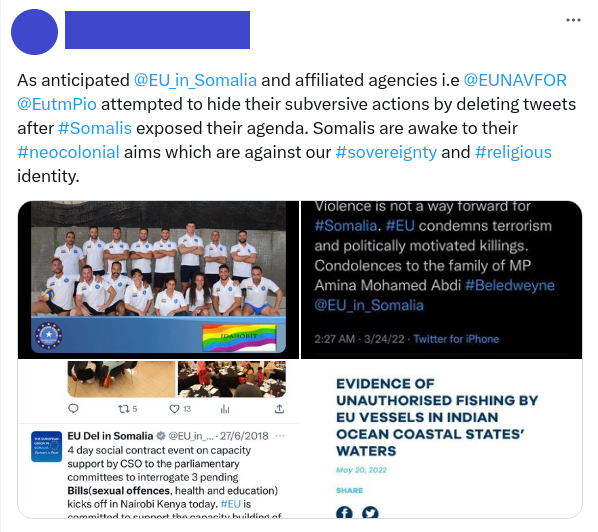EEAS report on FIMI targeting LGBTIQ+ people uncovers how foreign disinformation campaigns are designed to exploit vulnerabilities, polarise societies and sow divisions, particularly those targeting the LGBTIQ+ community. Russia’s Supreme Court recently upheld a claim by the Ministry of Justice, branding the “international LGBT public movement” “extremist,” and banning its activities in the country. It is far from clear what the Russian authorities mean exactly by the ‘’international LGBT movement’’, but it is regrettably certain that this move, which has been condemned by the EU, is an extension of the ongoing crackdown on LGBTIQ+ rights under Vladimir Putin, and will further stifle civil society and human rights defenders in Russia. It also makes it practically impossible to stage any actions in support of the LGBTIQ+ community, preventing members of that community from exercising their civil and political rights.
Table of Contents
By EUvsDisinfo | December 08, 2023 —
Given these developments, the recent EEAS report on foreign information manipulation and interference (FIMI) targeting LGBTIQ+ people has gained new relevance. It uncovers how foreign disinformation campaigns are intricately designed to exploit vulnerabilities, polarise societies and sow divisions, particularly those targeting the LGBTIQ+ community. It also illustrates a disturbing pattern of targeted disinformation campaigns, echoing the broader trend of repression and discrimination against the LGBTIQ+ community, as now exemplified by this recent ruling of the Russian Supreme Court.
Analysts identified 31 cases of foreign information manipulation between June 2022 and July 2023, which were primarily focused on tarnishing the image of LGBTIQ+ communities. These cases came in fifteen separate languages across three dominant platforms: Telegram, X (Twitter) and websites. Almost half of the cases related to a specific event, including LGBTIQ+ events; for example Pride Month and marches, the International Day Against Homophobia, Biphobia and Transphobia (IDAHOBIT); breaking news events such as the 2023 Nashville school shooting; and sporting events.
The report goes on to reveal that usually the LGBTIQ+ movement is attacked as a whole, with two groups being especially vulnerable: trans and gay/lesbian communities. Other entities attacked include Ukrainian and German organisations, but also the EU as a whole, sports organisations, NATO and others, all with a common goal – to degrade members of the LGBTIQ+ community.

Findings of the “FIMI Targeting LGBTIQ+ People” report, p. 13
The most common meta-narratives used by the threat actors to target the LGBTIQ+ community included “Gayropa”, which depicts Europe as a sort of dystopian realm characterised by sexual perversion. “Gayropa” exports this to other regions via its neo-colonial practices, by means of the so called “LGBT / gender agenda”, and aims to threaten traditional values, such as the natural family and traditional order.
The EEAS report also underscores the tactics and techniques used to convey these messages, and some of them are very crafty. Examples include the promotion of cyber-attacks against international entities, the development and sustained promotion of a web-based online game, or calls for offline actions and protests.
Let us delve into more detail on the three most important techniques identified in the report.
Impersonation Galore
Imagine finding a news story from a source you trust, only to discover it is all made up. This is what impersonation in information manipulation is all about. The perpetrators create fake social media accounts, websites, or content, mimicking legitimate entities. This sneaky tactic is not just about spreading falsehoods, but also about gaining credibility, and sowing doubt against the real entities. This was the case with the listing of a fake job vacancy, impersonating a Ukrainian non-profit organisation, which was posted on a Ukrainian online job portal, and later disseminated by Russian state-linked accounts on different social media platforms. The post advertised a fake position for a mentor for the Armed Forces of Ukraine. Among the requirements listed were an “active sexual life”, “absence of venereal diseases” and “identifying hidden gays”, with plenty of derogatory language targeting LGBTIQ+ people vis-à-vis the Armed Forces of Ukraine.

The job ad posted on a Ukrainian job portal, impersonating a Ukrainian NGO (text translated from Ukrainian to English)
Fabrication and Alteration of Documents
This time, think of Photoshop on steroids. Here, documents are either completely fabricated, or altered to suit the narrative. This method is particularly insidious as it presents a veneer of authenticity that can mislead even the most discerning eyes. Fabricated documents or content, such as flyers, are also tailored to specific audiences, or used to attack official entities, groups or individuals. The example analysed in the report appeared in June 2023, and targeted audiences in the Central African Republic with images of fake flyers posted online. The photo on the flyer showed two men kissing, and purportedly promoted a French brewery, while explicitly claiming the “promotion of European values”. This fabrication was disseminated on unattributed X (Twitter) accounts and Facebook pages. Later examination of the incident revealed those same pages frequently promoted content from other Facebook pages linked to private Russian military companies.

Fake flyer targeting African audiences
Exploiting Social Media Architecture
This tactic is all about leveraging the features of social media platforms. It includes coordinated tagging, replies, and the creation of content that is designed to go viral, thus amplifying deceptive messages across a broader audience. It is a particularly insidious tactic in the context of LGBTIQ+ rights and people, as the coordinated tagging and replies often aim to intimidate and silence designated opponents. In May 2023, a network of unidentified social media accounts targeted X (Twitter) and Facebook, systematically engaging with the official accounts of various EU entities, such as the EU Delegation in Somalia, and EUNAVFOR. This coordinated action was in response to a tweet by the EU Training Mission in Somalia, which featured a sports team displaying the rainbow flag for IDAHOBIT. These accounts circulated a screenshot of the tweet, accusing the EU of disregarding Somali cultural values and religious beliefs.

An example of a post tagging EUTM Somalia and the collage used in the FIMI incident
The LGBTIQ+ Community and Elections
At EUvsDisinfo we write extensively on how foreign information manipulation and interference threat actors target elections in the EU member states and beyond, for example during the recent Polish elections, elections in Spain and local elections in Moldova. We have also debunked claims that the EU is against democracy in Africa.
An election period is a very productive time for threat actors to spin their favourite narratives, and like a broken record, scare the public about imaginary bogeymen, be it LGBT people, Muslims, or migrants, and paint a gloomy picture of “Gayropa” in decay, spreading its “LGBT propaganda” as a newly found form of colonialism. This impacts LGBTIQ+ people in two ways, on the one hand further blackening their name in society, and on the other influencing their participation in the electoral process, due to the fear of persecution, or structural barriers, stopping them from exercising their right to vote.
In its recent report on strengthening the participation of LGBTI+ persons in political and electoral processes, the UNDP noted the progress that has been made. Globally, electoral management bodies have implemented policies to ensure non-discriminatory voting rights for trans and non-binary individuals, including respectful identification procedures, and targeted voter education campaigns. The presence of LGBTIQ+ leaders in elective offices significantly contributes to the recognition of rights and policies beneficial to the community, yet subsequent years have brought little progress.
The LGBTIQ+ community continues to face structural, individual, and organisational barriers, hindering its full participation in politics and elections. This is often marked by exclusion, lack of visibility, discrimination, and violence, fuelled by attacks on social media.
It’s imperative that LGBTIQ+ individuals, and supporting organisations, can exercise their civil and political rights freely, including the right to vote, to be elected, and to express themselves, to ensure their human rights are respected, upheld and sustained.
A roadmap for action
In this regard, the “FIMI targeting LGBTIQ+ people” report is not just a wake-up call; it is also a roadmap for action. It is about recognising the hidden threats lurking in our information spaces and taking concrete steps to safeguard, not just the rights of LGBTIQ+ people, but also the very principles of our democratic societies.
That said, the report also offers a beacon of hope, with some solid recommendations. It calls for a unified front – governments, academia, industry, civil society, and local communities need to join forces. Sharing information on emerging threats, collaborating on responses, and identifying ways to support each other are crucial steps forward.
The report also underscores the role social media platforms can play. There’s a need for these platforms to disrupt the spread of FIMI effectively, which might mean investing in new features that are essential for the greater good.
In conclusion, the fight against FIMI is not just a battle for the rights and dignity of the LGBTIQ+ community, but also a defence of our democratic institutions and values. As we embrace these recommendations, we inch closer to a world where information is a tool for empowerment, not manipulation.










